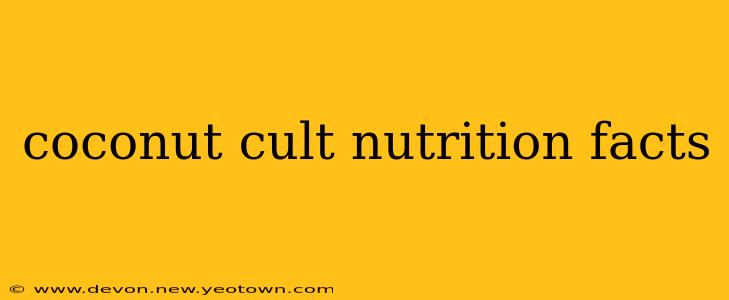The coconut, once a tropical delicacy, has stormed the global food scene, earning a devoted following often dubbed the "coconut cult." But beyond the trendy appeal, lies a fruit packed with nutrients that genuinely deserve the hype. Let's unravel the nutritional facts behind this celebrated fruit and explore why it's earned its place in so many health-conscious kitchens.
What are the main nutritional benefits of coconut?
The nutritional benefits of coconut are surprisingly diverse, stemming from its unique composition. We're not just talking about the creamy flesh of the coconut; we're encompassing the whole package – the water, the milk, the oil, and the flesh itself. Each component boasts its own unique nutritional profile.
Coconut water, for instance, is a natural electrolyte drink, providing potassium, sodium, and magnesium, making it a fantastic natural rehydration option after exercise. Coconut milk, often used in curries and desserts, offers healthy fats and a creamy texture. Coconut oil, a staple in many kitchens, is rich in medium-chain triglycerides (MCTs), which are quickly metabolized by the body for energy. Finally, the coconut flesh itself provides fiber, healthy fats, and various micronutrients.
Is coconut good for weight loss?
This is a nuanced question. While coconut contains healthy fats, it's also relatively high in calories. The key to incorporating coconut into a weight-loss diet is moderation. Replacing less healthy fats with coconut oil, for example, might be beneficial, but overconsumption can lead to weight gain. The fiber content in coconut flesh can contribute to feelings of fullness, potentially aiding in appetite control, but this shouldn't be solely relied upon for weight management. A balanced diet and regular exercise remain crucial for successful weight loss.
Is coconut good for your skin and hair?
The answer is a resounding yes! The fatty acids in coconut oil have shown promising results in improving skin hydration and reducing dryness. Many people use coconut oil as a natural moisturizer, and its antimicrobial properties can help in treating certain skin conditions. Similarly, the nourishing properties of coconut oil can benefit hair health, potentially improving shine, reducing breakage, and promoting healthy growth. However, it's always advisable to conduct a patch test before applying coconut oil directly to your skin to rule out any allergic reactions.
Does coconut have any negative effects?
While generally safe for consumption, coconut can have potential downsides for some individuals. High consumption of coconut can lead to weight gain due to its calorie density. Some people may also experience digestive discomfort, such as bloating or diarrhea, when consuming large amounts of coconut or coconut products. Additionally, those with allergies to coconut should obviously avoid it completely. Moderation is key, as with most foods.
What are the different types of coconut products and their nutritional value?
The versatility of the coconut is reflected in the diverse range of products derived from it. We've touched upon coconut water, milk, and oil, each with its distinct nutritional profile. There's also desiccated coconut, shredded coconut, coconut flour, and even coconut aminos (a soy sauce alternative). Each product offers slightly different nutritional values, depending on the processing method and the part of the coconut used. For instance, coconut flour is significantly lower in fat compared to coconut oil. It’s worthwhile exploring the nutritional information panels of specific products to make informed choices.
How can I incorporate coconut into my diet?
Integrating coconut into your diet can be a delicious and nutritious adventure! You can add shredded coconut to your yogurt, sprinkle desiccated coconut on your granola, use coconut milk in smoothies or curries, cook with coconut oil, or simply enjoy a refreshing glass of coconut water. The possibilities are endless, allowing you to tailor your coconut intake to your preferences and dietary needs. Remember to prioritize quality, opting for products with minimal processing whenever possible.
The coconut's rise to fame isn't merely a fleeting trend; it's a testament to its inherent nutritional value. By understanding its diverse benefits and potential drawbacks, we can responsibly enjoy this tropical treasure as part of a healthy and balanced lifestyle. So go ahead, embrace the "coconut cult," but do so mindfully and savor the delicious and nutritious journey!

